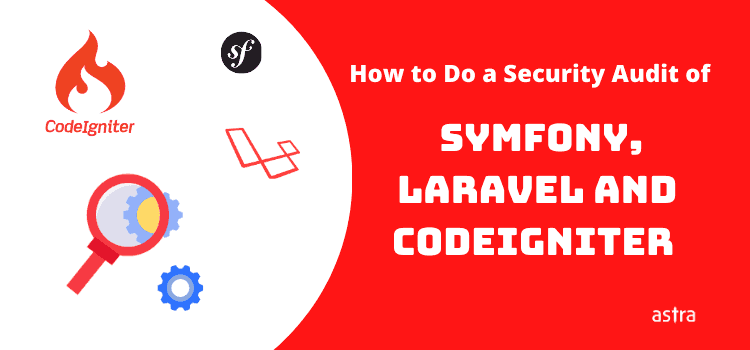PHP is still widely used to develop websites and open-source CMSes. However, developing large applications using PHP can turn out to be time-consuming. So to overcome that, certain frameworks like Symfony, Laravel, and Codeigniter are used.
These frameworks come with certain pre-built components that can be reused to develop web applications faster and easier. However, even these frameworks are not entirely secure. A small vulnerability in any one of them can seep down to thousands of web apps developed using them. To check such bugs beforehand you can conduct a Symfony security audit, Laravel security audit or Codeigniter security audit.
Today we are going to discuss the common security issues in these frameworks and how to overcome them with a thorough security audit.
1. Symfony
The official website of Symfony describes it as,
Symfony is a set of reusable PHP components and a PHP framework for web projects.
And rightly so. It contains a collection of frequently used components. For example, while building multiple web applications, you will need an authentication component of some sort. So, instead of re-building the login component every time, Symfony can create one for you on the go. Similarly, it contains other commonly used components like forms, filesystem, etc.
Need for Symfony Security Audit
Building your web app using Symfony is easy, however, it does not imply that it is free of vulnerabilities. Symfony has had its fair share of vulnerabilities in the past. Many of its components were found vulnerable to XSS, SQLi, etc attacks. For instance, symfony/http-foundation was found vulnerable to SQLi and XSS bugs termed as CVE-2019-10913.
In all these cases, the vulnerability of one component could have compromised thousands of web apps using that component.
To avoid such a scenario, it becomes very necessary to find and patch these vulnerabilities. Conducting a Symfony security audit helps you with that and more.

2. Laravel
Similar to Symfony, Laravel is a framework that makes it easy to develop web applications. Laravel is very diversified and has a big web ecosystem. According to the official website of Laravel,
We believe development must be an enjoyable and creative experience to be truly fulfilling. Laravel attempts to take the pain out of development by easing common tasks used in most web projects.
Need For Laravel Security Audit
Although the Laravel code is checked by the community for security errors, yet one or two usually slips by. For instance, the Laravel framework versions 5.5.40 and 5.6.x through 5.6.29, were found vulnerable to remote code execution. Termed as CVE-2018-15133, this bug was caused due to a vulnerable X-XSRF-TOKEN value. What is more alarming is that there exists a Metasploit module to exploit the same!
This makes conducting a Laravel security audit a must. It can help in checking your web app for any such vulnerabilities and save you from any misfortune whatsoever. A vulnerability assessment also helps in patching them before the web app goes live.
3. Codeigniter
In the series of PHP frameworks mentioned above, coming next is Codeigniter. Codeigniter is another powerful and lightweight framework used to build web apps. It also consists of clear documentation that helps anyone learn it efficiently. Another big advantage of Codeigniter is that it offers a simple routing method.
The official website of Codeigniter defines it as,
CodeIgniter is a powerful PHP framework with a very small footprint, built for developers who need a simple and elegant toolkit to create full-featured web applications.
Need for Codeigniter Security Audit
Using a framework to develop PHP web apps does not always guarantee security. For instance, CodeIgniter prior to 3.1.3 was found vulnerable to a remote code execution bug. This was termed as CVE-2016-10131 and was caused due to vulnerable system/libraries/Email.php.
This meant that all the web apps which had used the Email.php of Codeigniter before 3.1.3 were also vulnerable to RCE. To catch such bugs before hackers exploit them, performing a Codeigniter security audit is necessary. Indulging in a periodic security audit ensures the safety of your web app in the long run.
How to perform a security audit of Symfony, Laravel or Codeigniter?
Since all the above-mentioned frameworks use PHP, a set of common tools can be used for the security audit of web apps developed using these frameworks. These tools can be installed manually too but it is advisable to use Kali Linux for this purpose for Kali Linux comes preloaded with most of these tools.
If you are a window user and wish to use it using a virtual box, you can set it up like this.
Once the setup is done, you are ready for the security audit part so let’s dive in!
1. PhpStan
This tool is widely used to security audit the static code of the PHP web app generated by the above-mentioned frameworks. This tool is not included in the official Kali bundle so you will have to download and install it manually. Once installed, you are ready to use PhpStan. Now suppose the files of your web app are in the tests and src folders. Then, open the terminal and run the following command:
vendor/bin/phpstan analyse src tests
Moreover, PhpStan has unofficial extensions specifically for Laravel known as Larastan and one for Symfony too. So you might want these based on specific frameworks.
2. Sqlmap
The SQL injection is one of the most common vulnerabilities found in the web apps during a Symfony, Laravel or Codeigniter security audit. This bug can be hunted by using Sqlmap. You can either test your web app for SQLi bugs live on the internet or you can test them on your local server. For example, the page you wish to test for SQLi is “test.php” and parameter is “param” then, open the terminal in Kali and type:
sqlmap -u "www.example.com/test.php?param=1" --dbs --random-agent --dbs
This command will try to check test.php for SQLi vulnerability. If present, Sqlmap will try to enumerate database names too. For more detailed usage options, refer to the official documentation.

3. Xsser
Another most common bug found during a Laravel, Codeigniter or Symfony security audit is an XSS vulnerability. These can be hunted down using Xsser; a tool to discover as well as exploit XSS bugs by bypassing security filters.
Beginners may find it easy to use this tool using the graphical interface. So, open the terminal in Kali and type:
xsser --gtk
In case this command does not work or you have not set the environment variables then try:
python3 xsser --gtk
This will open a graphical interface like the one in the image below. Just set the necessary options and start finding XSS bugs. For more details on the options, refer to the documentation of this tool.

4. Fimap
File inclusion vulnerabilities are also commonly found in most web apps along with XSS and SQLi bugs. To scan your web app developed using Laravel, Symfony or Codeigniter for file inclusion bugs, Fimap can be used.
For example, if you wish to scan the “index.php” page for file inclusion vulnerabilities, open the terminal in Kali and run the following command:
fimap -u "http://www.example.com/index.php"
For more info on the usage, in the terminal type:
fimap -h
Security Audit Service for Symfony, Laravel, Codeigniter
This article is just an introduction to Symfony, Codeigniter, and Laravel security audit. it barely scratches the surface and covers only the basics. There is a lot that needs to be checked to ensure the security of web apps developed using these frameworks.
This is why to ensure maximum security it is recommended to go for a professional security audit. Astra contains a very flexible security and penetration testing plan.
It doesn’t matter if you own a small blog or run an online store, Astra has something for everyone at very affordable prices. Its comprehensive security audit covers major issues like:
- Configuration and Deployment Mis-configuration.
- PHP Core, Plugins & Theme Specific Vulnerabilities.
- Broken or Improper Authentication.
- Identifying Technical & Business Logic Vulnerabilities.
- 1250+ Active Security Tests.

Still, have some doubts? Leave a comment below or drop us a message using the chat widget.
















